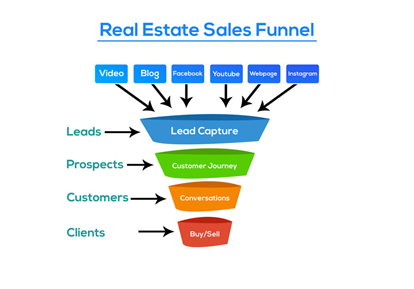Finding success in real estate lead generation is all about persistence, timing, and the quality of your data. Creating simple habits and systems to keep you focused on the tasks that matter will pay off significantly over time. While online project management tools are a good fit for some, there’s nothing wrong with using a physical calendar and notepad – it's all about what works best for you.
Practicing the principles below will help you create an effective lead generation process, build a trusted brand, and become a partner that clients are proud to refer.
How to Strike When the Iron is Hot
What if you could market only to people who are highly likely to list their home?
How would it impact your business if you could predict the exact right time to follow up with a real estate listing lead?
The full answer to both of those questions requires a detour into predictive analytics; but we’ll cover that topic in detail later. For now, you can manually use some of the qualifying questions below to help determine if you’re generating and nurturing the right leads.
There are two primary windows of opportunity for real estate agents. The first is when someone decides to buy or sell but has not yet chosen an agent.
The second window of opportunity occurs after a specific length of time has passed since someone purchased a home and research shows that they are likely to be interested in moving again. Indicators that a home owner is ready to sell soon include the following:
• They’ve requested a formal (or informal) home value assessment to see the market price.
• The current owners previously tried FSBO and took the house off the market (or it has been listed FSBO for months with little activity).
• Nearby homes have recently sold above the asking price and demand for homes in their neighborhood remains high (with low inventory).
• The seller listing has expired without an offer being accepted.
• You’ve learned from a referral source that a homeowner has purchased another home already, or started renovations and cleanup for their property in anticipation of listing soon.
Getting some of the information described above can be the result of hard work, smart questions, and trusted relationships built over time - or it can be dumb luck.
To remove luck from the equation as much as possible, we recommend adding consistent lead generation activities to your routine prospecting. Picking and performing even of few of the following tactics will increase your chances of finding motivated sellers that are ready to move.
Ready to get more listings?
Free Real Estate Lead Generation Ideas
There’s absolutely nothing wrong with being on a budget. To help agents that are looking for low or no-cost marketing approaches that can be started today, we’ve compiled a list of the top free real estate lead generation ideas that can still produce excellent results if executed with a smart plan and consistent approach.

Image credit: Matt Crabbs
Direct Outreach
•
Cold calling. Good old-fashioned dialing is still a great way to make genuine connections, and good agents can convert
1-2% of their calls into genuine leads. The right script and a friendly demeanor can actually make cold calling a pleasant experience. If you’re at a total loss for how to get started, this guide on
real estate cold calling from Pipedrive has tons of great recommendations and pre-written scripts to help you get started.
•
Cold knocking. Face-to-face selling is perhaps the most daunting of all sales methods. Door-to-door sales makes most people nervous, but it gets easier over time and it’s a great way to build genuine rapport with interested prospects. Pick a neighborhood where you know there is a lot of interest and activity. This tactic is particularly effective if you’ve recently helped another seller in the area because homeowners have had time to see your signs (and they probably snooped on Zillow to see the estimated sale price). The Close has collated professional
insight and talking scripts if your knees are knocking at the thought of going door-to-door.
• Offer to teach workshops on topics that would be relevant to your ideal listing leads. These free workshops could incur some cost (e.g., printed materials) or you could distribute a digital copy of the presentation for free. As a local small business or sole proprietor, you can likely use a classroom or conference room at your local chamber of commerce, library, or co-working space. Examples of relevant topics could include:
o Secrets to Getting the Highest Price for Your Home.
o 7 Essential Steps to Prepare Your Home for Listing.
o Expert Tips for First Time Home Buying and Selling.
o How to Buy Your Dream Home and Sell at the Same Time.
Pros:
• Quickly vet potential prospects and walk away with a firm “no” or contact info for a warm lead.
• Face-to-face time helps you remain top of mind for the prospect.
• Direct outreach requires little or no budget, making it attractive to new agents.
Cons:
• Cold calling and door-to-door sales is not scalable. You’re limited by how many numbers you can dial and homes you can visit.
• Cold outreach does not “passively” produce leads in the same way that a website or social media presence does.
• You probably don’t know who to target.
Learn more:
Thoughtfully Nurture Your Leads to Win More Listings
How do you helpfully and thoughtfully remain in touch with a prospect after your first meeting? Any of the recommendations below will set you apart from busybody agents that move on if they don’t sense an immediate opportunity.
• Handwritten notes. If you have 10-20 leads that are most likely to work with you (“hot,” in sales jargon), try putting a handwritten letter in the mail wishing your prospect well and referencing personal highlights from your initial meeting.
•
Email. Most agents will automate a regular email that sends listings they think will be of interest to the seller. This does work well, and it’s a good idea. However, people also like human touch points. They like personal outreach from a real email account with specific questions and concerns. Even once monthly direct (not mass) outreach will go a long way toward making you the preferred agent once they decide to list, as
these stats on email marketing show.
• In-person visits. Ask your top prospects to coffee or if you can stop by and chat. Personalized attention is sorely missed in the modern sales era, and it will help you stand out and earn future referrals.
• Texting has become a preferred method of communication for many agents and clients. A meaningful text after helping your client sell and find their next home is wonderful way to show that you actually care about them and weren’t focused solely on the sale.
Pros:
• Be memorable to prospects.
• Earn more referrals.
Cons:
• Befriending prospects can make it hard for them to say “no thanks” even if they don’t intend to work with you.
• It’s time consuming, meaning you can only focus on a few leads each day.
Learn more:
Collect Testimonials & Promote Word-of-Mouth Referrals
In 2020,
67% of clients chose their realtor based on the recommendation of a friend or family member. This number has increased in recent years, indicating that replacing the advice of a trusted referral source is only getting harder.
• Generate word-of-mouth buyer referrals by reaching out to other people in the neighborhood where you have a listing and encouraging them to refer family and friends that they would love to bring to the vicinity.
•
Ask for and feature client reviews on your website, social media, and Google My Business page. These types of reviews act as
social proof and the also bolster your online legitimacy, which supports local SEO.
Pros:
• Testimonials are more meaningful to prospects than your pitch.
• Word of mouth is the single biggest deciding factor for many clients.
Cons:
• It takes time and effort to consistently follow up with clients when asking for referrals and testimonials – though it’s highly worthwhile.
Learn more:
Study up on best practices for collecting and using
client testimonials as a free word-of-mouth promotional tool. Tools like
Reach150 will make this process much easier.

Image credit: hero0fwar
Solidify Your Brand & Spread the Word
Brand awareness is critical, but it’s not sufficient to ensure brand preference. Remember that your brand includes both tangible elements (e.g., colors, logos, copy, etc.) and intangible qualities (e.g., value, service, mission). Small adjustments like the ones recommended below cost little or nothing to make:
•
Review your messaging to ensure that it communicates your
differentiators and value propositions to leads. Most importantly, does it make people trust and prefer your services? A few small brand tweaks could help you connect with more prospects and win more business.
•
Build brand awareness through multiple
marketing channels. Today, brand awareness means a lot more than cool business cards and a nice logo. You have to establish an online presence. According to a 2019 article from
SproutSocial, 44% of home buyers now start their real estate search online. Can you use free business directory listings or social media to increase potential seller touch points?
•
Market to an underserved niche. If you’re having issues gaining traction as a “generalist,” research how you can develop expertise in a specific type of real estate. Do this by looking at the demographics of a neighborhood or and identifying common characteristics among sellers or the types of properties currently listed. How can you specialize in meeting the needs of specific sellers, properties, regions, financial situations, etc.? Read more from
Fit Small Business on the top 10 most lucrative real estate niches.
•
Brand your signage and leave behinds. There can a long period of time – often a month or more – during which the buyers and sellers are moving, giving you incredibly
valuable advertising in the neighborhood. Adding unique and personal touches to your leave behinds will make you much more recognizable.
• Vehicle wraps & stickers. There is an initial cost to purchase decals, magnets, or stickers. However, you don’t need to pay anything for the hundreds or thousands of eyes that might see the ads every way while you’re commuting or the car is parked on a busy street. Featuring your areas of specialty and a phone number or email address is a great way to generate business while you’re on the move.
• Leave your business card at local coffee shops or small businesses and give leads a reason to contact you, like: “call me to chat about your dream house over a free coffee.”
Pros:
• Generating brand awareness organically will give you more credibility.
• Focusing on a niche makes your messaging clearer and helps prospects quickly understand what you do.
Cons:
• Building brand awareness takes time if you’re not paying for advertising.
• If you make changes to your brands, you need to reprint and redesign each asset.
Learn more:
Dottie Herman explains the importance of branding for real estate professionals in her
full article.
Create Mutually Beneficial Referral Partnerships to Capture Listings
Professional relationships can be reliable long term lead sources. Developing personal connections can be done with essentially no budget if you’re willing to attend networking events or conduct outreach to potential referral partners.
Typically, a referral source is someone who has the trust of the seller but does not compete directly with your services. Referral partners often expect that you will also recommend their services, if needed by the client. Common examples of real estate referral sources include:
• Personal bankers
• Contractors
• CPAs
• Real estate attorneys
• Interior designers and decorators
Pros:
• Good referral sources can be as trusted and effective as client word-of-mouth referrals.
• Once established, these relationships can last well into the future.
Cons:
• Staying in touch with various referral sources requires time.
• You’re not guaranteed that referral sources will consistently (or ever) send business to you.
Learn more:

Image Credit: Homes.com
Host an Open House
Open houses can attract interested sellers from the surrounding community. This is particularly effective if you have a listing in an area that you'd like to cultivate further.
Although these visitors might only be curious at first, they’ll remember meeting you and will take note of how quickly you are able to help their neighbor sell.
Use the open house to distribute branded or value-added resources that demonstrate your knowledge of the local market.
Pros:
• Open houses can require little or no cost to host.
• Increased signage and foot traffic might spark new conversations.
Cons:
• Open houses can attract unqualified buyers or nosey attendees that aren’t serious about next steps.
Learn more:
The
Rochester Real Estate blog shares at length about pros, cons, and recommended strategies to consider for using open houses to generate business.
Email Newsletters
Create an email newsletter and share valuable information; even if it’s only once a month. The tools required to draft and send mass emails are often free. Here are a few simple examples of topics you could cover in your newsletter to help prospects on their real estate journey:
• Client testimonials.
• Local real estate data.
• Listings that you recently sold.
• Tips on how to list a home.
Pros:
• Prospects will save and recall good emails, helping you stay at the forefront of their mind.
• You can encourage prospect to join your list directly from your website or social media, improving your lead generation funnel.
Cons:
• Designing and copywriting emails could feel out of your wheelhouse.
• Using email campaign software requires a bit of technical knowledge and practice.
Learn more:

Image Credit: Yevbel
Social Media
Social media provides realtors with access to an enormous market of potential leads. Actively managing your accounts does require an investment of time, but it’s still one of the best ways to earn brand recognition and generate new prospects.
Even without paying for advertising, most social media platforms will help you reach sellers if you’re willing to spend time consistently connecting and posting helpful content.
LinkedIn
LinkedIn is primarily a professional networking platform. If you don’t currently have a LinkedIn, or if it’s been a few years since you last checked it, here are a few advantages of maintaining an active profile:
• Easily network and connect with potential referral partners.
• Target higher earning buyers or sellers with direct messages.
• Build your brand by getting marketing materials directly in front of potential clients.
Facebook, Instagram & Pinterest
Direct networking and relationship building on social media is incredibly powerful. Not only does social media provide free access to an enormous community of leads, it often results in
higher quality prospects when compared to other online sources.
Focus on these simple tactics if you want to improve lead generation through social media:
• Continually grow your network through outbound connection requests. Think of this like a “data cost,” though it’s not going to be as targeted as other methods of purchasing lists.
• Create closed groups on social media to provide valuable information to members.
•
Consistently post branded content that is relevant to your ideal clients, even if you’re not technically savvy or experienced with design. Websites like
Fiverr and
Upwork can help you find low-cost freelance support, if needed.
• Periodically conduct research on competitors to evaluate what methods might be working for them.
- Are they using Facebook events for their open house?
- Do they frequently post video testimonials?
- What content gets a good response?
- Do they participate in neighborhood or community-specific groups?
Pros:
• You can quickly reach thousands of people with good content or interesting listings.
• Respond immediately to and speak directly with clients who contact you through social media platforms.
Cons:
•
Organic postings require you to create attractive media assets like video, pictures, and infographics to stand out.
• Social media platforms are also crowded with competitors, some of whom have spent years perfecting their brand online.
Learn more:
_____________________________________________________________

Paid Real Estate Lead Generation Ideas
Paying for lead lists or Google advertising can increase your potential for rapid growth. However, not all paid real estate lead generation activities are created equal. Marketing budgets can easily disappear on advertising and data costs if you don’t carefully plan, test, and measure your results.
The remaining recommendations in this article vary in their effectiveness and in the quality of data used for campaigns. Some of the paid tactics listed below require you to manage the operations, while others are mostly done for you (depending on the provider). Each of these factors should be considered when building the right marketing plan for your budget, needs, capabilities, and preferences.
If you have budget ready to unleash in 2022, let’s get started!
Paid Networking Groups
Networking groups that are closed to the general public can be gold mines of valuable connections and leads. Because they are vetted and pay (sometimes a lot) for access, members take the commitment and quality of each relationship seriously. Real estate industry veterans recommend groups like the following:
• Chambers of commerce.
•
Business networking international (
BNI).
• Local after-hours networking groups.
• Rotary organizations.
• Trade associations.
Pros:
• Meet referral sources and prospects while building brand awareness.
• Hyper-focused members support each other, and you can have exclusive industry representation (in some groups).
Cons:
• Some organizations can be saturated with competitors if they don’t control membership.
Learn more:
Here’s some helpful guidance from Rocket Pro on
local networking for real estate agents.
Geographic Farming
No, real estate farming doesn’t require you to get your shoes dirty. In real estate, the concept of farming is used to describe the gradual cultivation of a geographically-defined market that has been selected due to specific demographics.
Other key data to consider when selecting a farming territory includes the historical turnover rates, price trends, and
absorption rate.
Real estate farming involves both paid and free marketing tactics, but it will require an investment of time and resources to return the highest yield. To effectively farm a territory, try an approach like the following:
• Select the territory that you want to develop.
• Set your goals – how will you know if you’ve been successful?
• Develop an outreach plan that includes multiple touch points over time.
• Execute your outreach plan and monitor the results.
• Nurture new leads toward close.
• Rinse and repeat to stay top of mind for new prospects.
Pros:
• Become the go-to agent in a specific neighborhood.
• Generate highly trusted word-of-mouth referrals.
• Earn repeat business.
Cons:
• Without predictive analytics, only time will tell if you’ve picked the right area and use the right farming techniques.
• Competitors might be targeting the same region.
• You might be missing a better opportunity nearby with a higher likelihood of listings.
Learn more:
Real Estate Lead Generation Companies
You can buy real estate leads from providers like BoldLeads, SmartZip, Offrs, and Market Leader, among others. These companies use different methods of capturing leads and gauging their intent to buy or sell a home. Some lead generation companies will provide data and a CRM or other tools used for outreach.
Pros:
• Other than paying for the service, there’s virtually no additional work involved to receive leads.
• Once a strategy has been dialed in, lead flow can become fairly consistent.
Cons:
• The quality and results will vary based on how the provider sources their data.
• Lead volume can ebb and flow, though you may not know why.
Learn More:

Image Credit: Marketing Evolution
Targeted Real Estate Lead Generation with Predictive Analytics
Companies like
SmartZip use a proprietary form of predictive analytics to
target leads that are the most likely to sell soon. By analyzing multiple historical data points and applying machine learning, SmartZip is able to accurately estimate the degree of interest for specific listing leads.
This means that rather than focusing your efforts on a specific neighborhood you’re focused on specific sellers.
After helping you narrow down the data to only high-value leads, SmartZip also provides a suite of digital and traditional marketing tools to help you reach, engage, and convert more listings.
The results speak for themselves:
“The SmartTargeting program is the most profitable program I am working with right now.”
- Steve Johnstone | Keller Williams Infinity
“38 closed listings in her second year. The best listing generation program I have ever used.”
- Dana Hall-Bradley | Better Homes and Gardens Real Estate Fine Living
How Does Predictive Analytics Compare to Other Types of Lead Generation?
|
Lead Generation Tactic
|
Multi-Channel
|
Audience Targeting
|
Listing Intent Known
|
|
Traditional advertising
|
X
|
|
|
|
Digital advertising
|
X
|
X
|
|
|
SmartZip predictive analytics
|
X
|
X
|
X
|
Predictive analytics lead generation comparison.
Pros:
• Target leads that are the most likely to list.
• Concentrate your lead generation efforts.
• Get the highest ROI for your budget.
• Consistent lead flow.
Cons:
• Even good leads can take time to nurture and convert.
• Results can take time to produce.
Learn more:
Discover
SmartZip’s predictive analytics and see exactly how you can generate leads on a no-pressure
demo today.
Facebook, Instagram, and Pinterest
The organic reach of most social media platforms is already huge. Advertising on social media can make your reach exponential. In fact,
44% of realtors report getting at least one new client through social media.
There are multiple approaches to paid lead generation tactics on social media, including the following:
• Paid advertisements focusing on your services or results.
• Promoted offers to provide a free home valuation or consultation.
• Promoted posts highlighting success from a current client testimonial.
•
Set up an automated chat flow on your company page using tools like
ManyChat. These tools can qualify leads and answer basic questions before connecting them with you.
Pros:
• Reach younger buyers (a significant majority of FSBO listers are older).
• Expand your audience or easily reach a new geography.
Cons:
• Lots of competitors use social media advertising.
• Users are getting better at tuning out advertisements.
• You’re not guaranteed that clicks and activity will result in new listings.
Learn more:
Here’s expert advice from realtors who
used social media to connect with prospects, build their brand, and win new business.
Image credit: Crestline
Traditional Advertising
Many local small businesses still use traditional tactics like billboards, radio, TV, and direct mail. These are a costly but quick way to build brand recognition and potentially secure listing leads.
Similar options include neighborhood canvassing with flyers or placing ads for current properties in local print publications.
While these “blitz” tactics can be effective, we recommend focusing efforts on the leads that are most likely to respond positively. This can be done by using
better data, which is the most effective way to get your message in front of the right potential buyers and sellers.
Pros:
• Traditional advertising can reach tens of thousands of people, increasing your brand awareness.
• Methods like direct mail are effective if you know who to target.
Cons:
• There are fewer ways to target specific audiences with most traditional advertising.
• It can be hard to track precise results and ROI.
Learn more about this topic:
Gina Baker wrote an excellent piece for Fit Small Business that explores
creative real estate advertising ideas for including both traditional and digital mediums.
Google Ads
When you use Google and other search engines to find local businesses, you’ll notice results at the top of most searches that are clearly labeled as an advertisement. Those businesses pay for every click that goes to their website.
Realtors can use Google ads to target leads that are conducting a basic search for buying and selling a home in their area.
Pros:
• Google ads can immediately convert qualified leads.
• Keeping your company in the top search results helps grow brand awareness.
Cons:
•
Recent research has shown that in some industries as many as
25% of clicks on Google ads can be fraudulent.
• Ads are highly competitive.
• There is no guarantee that leads who click on your ad will end up calling or asking for more information (even though you were charged for the click).
• Successfully running ads requires a baseline of technical experience with creating and managing campaigns on the ad network.
Learn more:
Websites & SEO
Today, setting up your own website is an essential part of starting a new business. According to
NAR, 69% of real estate agents have a website.
Organically ranking at the top of search results is a great method of generating real estate leads if enough people are searching for your services.
Most real estate agents generate business by focusing on local SEO. If you’re going to undertake some basic SEO, focus on the parts of your brand that stand out and be sure to emphasize your value proposition. For example:
• Do you specialize in a particular kind of real estate?
• Are you a top-rated provider?
• Do you have more experience than the competitors?
• Do you have a high-value listing with unique qualities that deserves a separate page on your website?
With an investment of only a few hours you could provide an excellent source of information on these topics.
Pros:
• Showing up in search results on Google builds credibility and significantly increases your chance of converting leads.
Cons:
• Local SEO is highly competitive.
• SEO requires significant technical competency to execute.
• Hiring an SEO firm can be cost prohibitive.
• Results take time to produce.
Learn more:
Summary
All of these real estate lead generation ideas might feel overwhelming.
Where should you focus your limited time and budget? If you’re on a budget, or if you need to carefully measure and prove your ROI then it’s best to focus on data where the intent of the sellers can be predicted.
If you’re looking for quick takeaway advice on how to generate real estate leads then remember the following:
• Be present where your ideal clients spend time (online and in-person).
• Use good data.
• Have a memorable and unique brand.
• Add value to your personal relationships.
• Be consistent in your real estate lead generation efforts.















